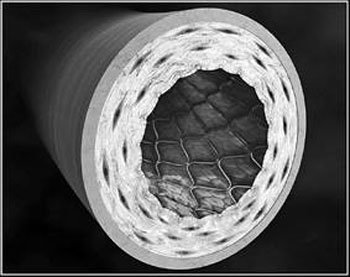Stents No Better Than Drugs

A study has found that angioplasty (the insertion of stents) is not a silver bullet for heart disease patients. Dr. William Boden of Buffalo General Hospital said at the American College of Cardiology meeting in New Orleans that the advantages of angioplasty have faded over the past five years according to a study because drug treatments are now better at controlling symptoms.
The study involved 2,300 patients throughout the U.S. and Canada who had substantial blockages, typically in two arteries, but who were medically stable. They had an average of 10 chest pain episodes a week, which is classified as moderately severe. The study showed that drug treatment is enough to treat heart attacks without invasive stent-inserting surgery.
In angioplasty, doctors make a small incision in a patient`s leg, allowing access to the main artery in the leg. Into that artery a balloon-tipped catheter is inserted. Due to the risks of blood clot and hemorrhage, patients need to stay in the hospital at least a day after the procedure.
Dr. Chung Nam-sik of Severance Hospital said, If the pain is not severe, patients should treat the symptoms with drugs, but the patient should receive stent-inserting surgery if the symptoms persist or he or she wants quick relief.
There is a controversy over the use of drug-coated stents. Concerns are centering on blood clots that can lead to myocardial infarction or death.
There are two stents used in Korea: metal and drug-coated. About 80 percent of treatments are done with the drug-eluting variety.
Dr. Cho Yoon-hyung of Kwandong Medical College said, More patients who received stent treatment and took antiplatelet antibody medication for 12 months developed myocardial infarction when they stopped their medication. It is advisable not to resort to using drug-coated stents unless patients are either in a serious condition or need to take antiplatelet antibody medication.
likeday@donga.com







